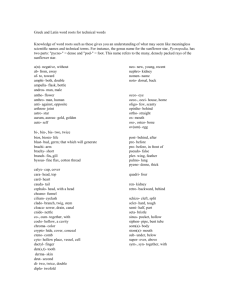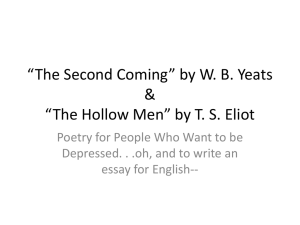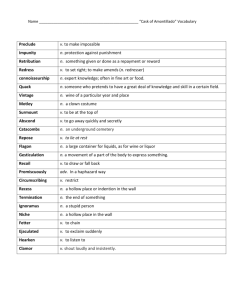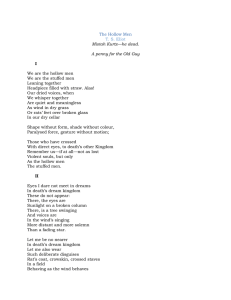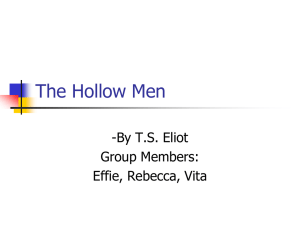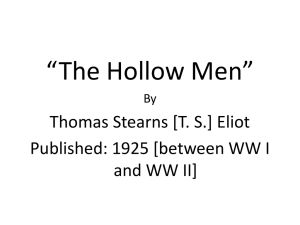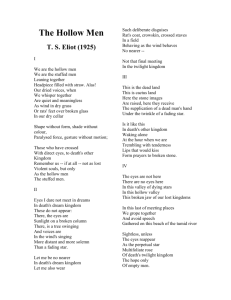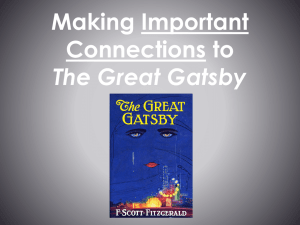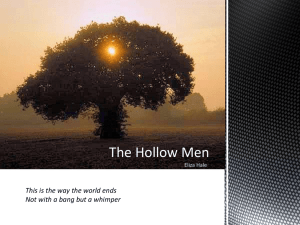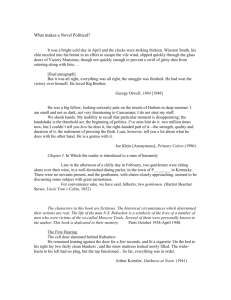Eliot's The Hollow Man
advertisement
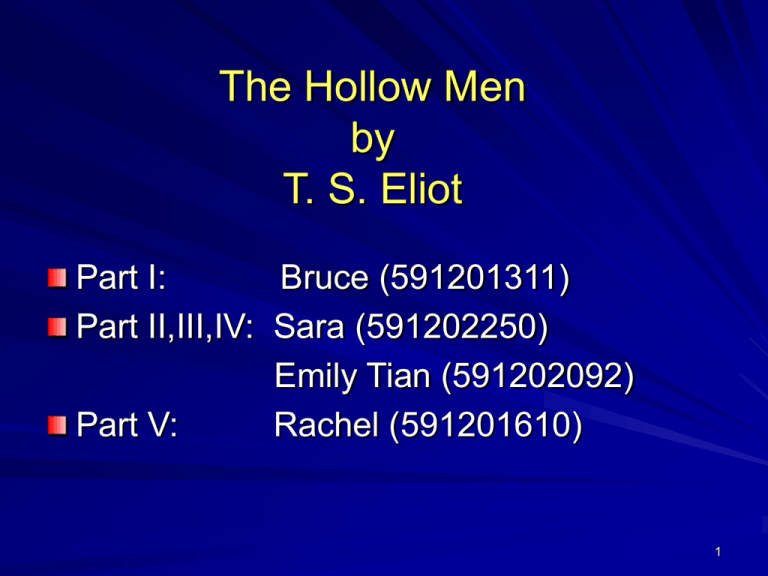
The Hollow Men by T. S. Eliot Part I: Bruce (591201311) Part II,III,IV: Sara (591202250) Emily Tian (591202092) Part V: Rachel (591201610) 1 Dante, Paradiso Dante, Purgatorio <http://pages.slc.edu/.../ blocks/poetry-asthetics.htm> 2 The Hollow man Source: http://www.dpnet.com.cn/school/school_darkroom5.asp?maxid=456 3 Nihilism Total rejection of all religious and moral belief. Belief that nothing really exists. The Hollow Man is one of nihilism work. Eliot made his style in writing The Hollow Man. 4 Four major sources of reference The historical account of “The Gunpowder Plot” Joseph Conrad: Heart of Darkness Dante’s Divine Comedy Shakespeare’s Julius Caesar 5 I Mistah Kurtz-he dead. A penny for the Old Guy. Epigraphs: Mistah Kurtz he dead: In Conrad's Heart of Darkness, this is the phrase used by the black cabin boy announcing Mr. Kurtz's death. Mr. Kurtz, a European trader, had gone into jungle ( The Heart of Darkness) with high intentions, but was soon barbarized by his own greed. "The wilderness ... found him out early....I think it whisper to him things about himself which he did not know—and the whisper ... proved irresistibly fascinating. It echoed loudly within him because he was hollow at the core." Describe his hollowness. 6 I We are the hollow men We are the stuffed men Leaning together Headpiece filled with straw. Alas! THE HOLLOW MEN: On the situation and the atmosphere, cf. Dante's account (lnferno III) of Hell's entrance where dwell in "the starless air," in "air forever dark," and "without hope of death," those "who never were alive“—"the wretched souls of those who lived without infamy and without praise" because they were not positive enough spiritually to be either good or evil. 7 Our dried voices, when 5 We whisper together Are quiet and meaningless As wind in dry grass Or rats' feet over broken glass In our dry cellar 10 Shape without form shade without colour, Paralyzed force, gesture without motion; 8 Those who have crossed With direct eyes to death's other Kingdom Remember us--if at all-- not as lost Violent souls, but only As the hollow men The stuffed men. 15 13-14. Those... Kingdom: i.e., those who stood for something positive, either evil or good, and so can really die, as the hollow men cannot. Hollow men stuffed men 9 20 II Eyes I dare not meet in dreams In death's dream kingdom These do not appear: There, the eyes are Sunlight on a broken column Eyes: In the Purgatorio, Beatrice’s eyes are a symbol of spiritual reality. 20: the image of heaven 23: a traditional graveyard memorial for a premature death. 10 There, is a tree swinging 25 And voices are In the wind's singing More distant and more solemn Than a fading star. Star: a symbol of both naturalistic flux and eternal spirit in the world. 11 30 35 Let me be no nearer In death's dream kingdom Let me also wear Such deliberate disguises Rat's coat, crowskin, crossed staves In a field Behaving as the wind behaves No nearer -Not that final meeting In the twilight kingdom Scarecrow: a symbol of spiritual looseness of the speaker. 32-34: The speaker conceals his lack of possibility. 37-38: The speaker may meet the eyes in the real world of the dead. 12 40 III This is the dead land This is cactus land Here the stone images Are raised, here they receive The supplication of a dead man's hand Under the twinkle of a fading star. Deathlike/ lifeless images: cactus/dead land, a fading star~ The hollow men are like themselves. 43: The speaker views himself as dead or dying and prays for getting out of emptiness and lifeless. 13 45 Is it like this In death's other kingdom Waking alone At the hour when we are Trembling with tenderness 50 Lips that would kiss Form prayers to broken stone. 46: The speaker’s empty life is another form of death. 51: whispering meaningless is just like a broken prayer. 14 IV The eyes are not here There are no eyes here In this valley of dying stars 55 In this hollow valley This broken jaw of our lost kingdoms In this last of meeting places We grope together And avoid speech 60 Gathered on this beach of the tumid river The eyes that may reappear beyond the river portend salvation. 54-56: the image of emptiness and death The water: A symbol of cleansing grace. 58-60: The image of the lost souls belongs to a boundary motif. 15 Sightless, unless The eyes reappear As the perpetual star Multifoliate rose 65 Of death's twilight kingdom The hope only Of empty men. 63: A symbol of the Holy Virgin 64: Dante’s Celestial Rose made of light 65-67: The hollow men remain sightless unless the rose reappears, love along with powers of creation and repentance is still sought in the world of nightmare. 16 Part II, III,IV The eyes, the rose and the star are equivalent the “Grail” of The Waste Land. The repetition of the same words, like “eyes,” ”broken,” ”death kingdom,” “a fading star,” makes powerful images. The hollow men appear as the “distraction, delusion, pretence” of the unenlightened people and each one of them is a “fugitive from reality.” 17 V Here we go round the prickly pear Prickly pear prickly pear 70 Here we go round the prickly pear At five o'clock in the morning. Between the idea And the reality Between the motion 75 And the act Falls the Shadow For Thine is the Kingdom Sex 18 V Between the conception And the creation 80 Between the emotion And the response Falls the Shadow Life is very long Sex and the creation 19 V Between the desire 85 And the spasm Between the potency And the existence Between the essence And the descent 90 Falls the Shadow For Thine is the Kingdom Sex, creation and salvation 20 V For Thine is Life is For Thine is the This is the way the world ends This is the way the world ends This is the way the world ends Not with a bang but a whimper. 21 Works Cited Eliot, T. S. “The Hollow Men.” The Norton Anthology of English Literature. Ed. M. A. Abrams. 7th ed. Vol. 2. New York: Norton, 2000. 2383-86. ---, T. S. “The Hollow Men.” 24 Nov. 2005 <http://www.d.umn.edu/cla/faculty/tbacig/hmcl1007/1007a nth/eliot.html>. A Hypertext Version of T.S. Eliot's “The Hollow Men.” 26 Nov. 2005 <http://www.aduni.org/~heather/occs/honors/Poem.htm>. Jimaine. Hollow Men. 2004. 26 Nov. 2005 < http://tostwins.slashcity.net/Hollow.htm>. Works Cited Eliot, T.S. “The Hollow Men” 1925. T.S. Eliot: The Complete Poems and Plays,1905-1950. New York: Harcourt, 1958. 24 Nov. 2005 <http://search.epnet.com/login.aspx?direct=true&db=aph&an= 7104250&lang=zh>. Picture Dante, Paradiso and Dante, Purgatorio. 27 Nov. 2005 <pages.slc.edu/.../ blocks/poetry-asthetics.htm>. Giuseppe C. Di Scipio. Ravenna. The Symbolic Rose in Dante’s Paradiso 26 Nov. 2005 Smith, Grover, J. Hillis Miller, David Spurr and Robert Crawford. On “The Hollow Men.” 24 Nov. 2005 <http://www.english.uiuc.edu/maps/poets/a_f/eliot/hollow.htm>. 23
